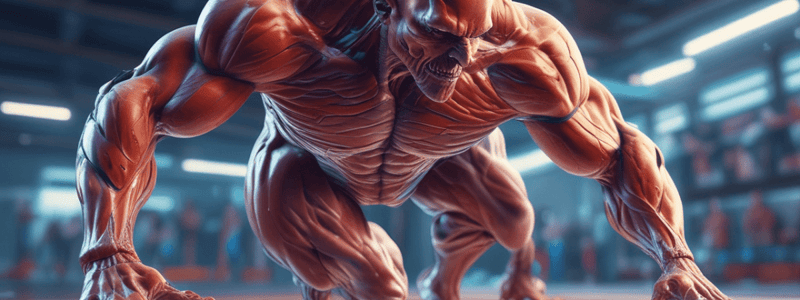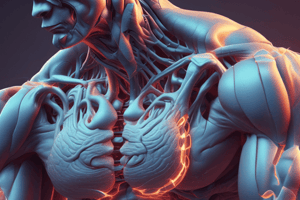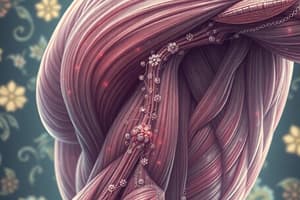Podcast
Questions and Answers
Which muscle is considered the main or prime mover in a particular movement?
Which muscle is considered the main or prime mover in a particular movement?
- Synergist
- Antagonist
- Co-contractor
- Agonist (correct)
Which type of muscle fiber is predominant in tonic or stability muscles?
Which type of muscle fiber is predominant in tonic or stability muscles?
- Slow-twitch (Type I) fibers (correct)
- Muscle fibers are not relevant for tonic or stability muscles
- Fast-twitch (Type IIa & IIb) fibers
- A mix of fast-twitch and slow-twitch fibers
What is the primary function of synergist muscles?
What is the primary function of synergist muscles?
- To oppose the action of the agonist
- To produce the main force for a movement
- To stabilize neighboring joints (correct)
- To contract simultaneously with the agonist
Which relationship describes how muscle length affects the force it can produce?
Which relationship describes how muscle length affects the force it can produce?
What is the term used to describe the simultaneous contraction of agonist and antagonist muscles?
What is the term used to describe the simultaneous contraction of agonist and antagonist muscles?
Which type of muscle is used primarily for short, powerful actions?
Which type of muscle is used primarily for short, powerful actions?
What is the primary function of muscles?
What is the primary function of muscles?
How are mono-articular and multi-articular muscles classified?
How are mono-articular and multi-articular muscles classified?
What happens when the number of cross bridges attached to actin filaments increases?
What happens when the number of cross bridges attached to actin filaments increases?
What is the function of the tendon?
What is the function of the tendon?
Which of the following describes a twitch response in a muscle fiber?
Which of the following describes a twitch response in a muscle fiber?
What is the difference between the origin and insertion of a muscle?
What is the difference between the origin and insertion of a muscle?
What is the role of multi-articular muscles?
What is the role of multi-articular muscles?
What happens when the frequency of stimuli to a muscle fiber increases?
What happens when the frequency of stimuli to a muscle fiber increases?
Which type of muscular contraction generates the least force when maximally stimulated?
Which type of muscular contraction generates the least force when maximally stimulated?
How can an understanding of muscle mechanics be applied?
How can an understanding of muscle mechanics be applied?
In which type of muscular contraction does the joint angle remain constant?
In which type of muscular contraction does the joint angle remain constant?
Which type of muscular contraction is produced during the use of an 'isokinetic dynamometer'?
Which type of muscular contraction is produced during the use of an 'isokinetic dynamometer'?
What is the primary function of a mono-articular muscle?
What is the primary function of a mono-articular muscle?
Which of the following is NOT a characteristic of a bi-articular muscle?
Which of the following is NOT a characteristic of a bi-articular muscle?
What is the typical range of muscle cross-sectional area that affects maximal joint torque?
What is the typical range of muscle cross-sectional area that affects maximal joint torque?
What is the relationship between the $FL/ML$ ratio and the muscle's force-velocity characteristics?
What is the relationship between the $FL/ML$ ratio and the muscle's force-velocity characteristics?
Which type of muscle contraction produces the highest torque?
Which type of muscle contraction produces the highest torque?
What is the primary function of the gastrocnemius muscle?
What is the primary function of the gastrocnemius muscle?
In the 'real world' situation, which statement is true about muscle contraction?
In the 'real world' situation, which statement is true about muscle contraction?
How does the pennation angle of a muscle fiber affect its force generation?
How does the pennation angle of a muscle fiber affect its force generation?
Which of the following statements about muscle action in the 'real world' is incorrect?
Which of the following statements about muscle action in the 'real world' is incorrect?
What is the main purpose of studying muscle mechanics?
What is the main purpose of studying muscle mechanics?
In the 'real world' situation, how does gravity affect muscle movement?
In the 'real world' situation, how does gravity affect muscle movement?
Which of the following statements about muscle contraction speed and torque is correct?
Which of the following statements about muscle contraction speed and torque is correct?
Flashcards are hidden until you start studying
Study Notes
Muscle Function and Classification
- The main or prime mover in a movement is known as the agonist muscle.
- Tonic or stability muscles predominantly consist of slow-twitch muscle fibers (Type I), which are endurance-oriented.
- Synergist muscles assist the prime mover by stabilizing joints and helping to produce a smoother motion.
- The length-tension relationship describes how optimal muscle length increases the force production capability of muscles.
- Cocontraction refers to the simultaneous contraction of agonist and antagonist muscles.
Muscle Contraction Types
- Fast-twitch fibers (Type II) are primarily used for short, powerful actions.
- The primary function of muscles is to facilitate movement and provide stability.
- Mono-articular muscles cross one joint, while multi-articular muscles span multiple joints.
Muscle Mechanics and Forces
- An increase in the number of cross bridges attached to actin filaments enhances muscle contraction strength.
- Tendons connect muscles to bones, transmitting force generated by muscle contractions.
- A twitch response in a muscle fiber is a single contraction cycle in response to a stimulus.
Muscle Attachment and Roles
- The origin of a muscle is the attachment point that remains stationary, while the insertion moves during contraction.
- Multi-articular muscles are involved in complex movements, allowing them to function across different joints.
- An increase in the frequency of stimuli to a muscle fiber leads to tetanus, a sustained contraction.
Muscle Contraction Characteristics
- Isometric contractions occur when the joint angle remains constant, producing tension without movement.
- Isokinetic contractions are performed with a constant speed against resistance, often using a dynamometer.
- Mono-articular muscles primarily function to produce movement at a single joint.
Muscle Fiber Characteristics
- Characteristics of bi-articular muscles include being able to cross more than one joint, allowing for versatility in movement.
- The typical range for muscle cross-sectional area impacting maximal torque is about 30-50 cm².
- The force-velocity relationship suggests a trade-off between force and the speed of contraction with a lower FL/ML ratio indicating higher velocity.
Torque and Functional Insights
- The type of muscular contraction that produces the highest torque is the eccentric contraction.
- The primary function of the gastrocnemius muscle is to facilitate plantarflexion of the foot.
- In real-world situations, gravity significantly influences muscle movement by providing resistance.
- The interaction between muscle contraction speed and torque typically indicates that slower contractions yield higher torque output.
Purpose of Studying Muscle Mechanics
- Understanding muscle mechanics aids in optimizing performance in sports, rehabilitation strategies, and preventing injuries, thus enhancing overall movement efficacy.
Studying That Suits You
Use AI to generate personalized quizzes and flashcards to suit your learning preferences.




